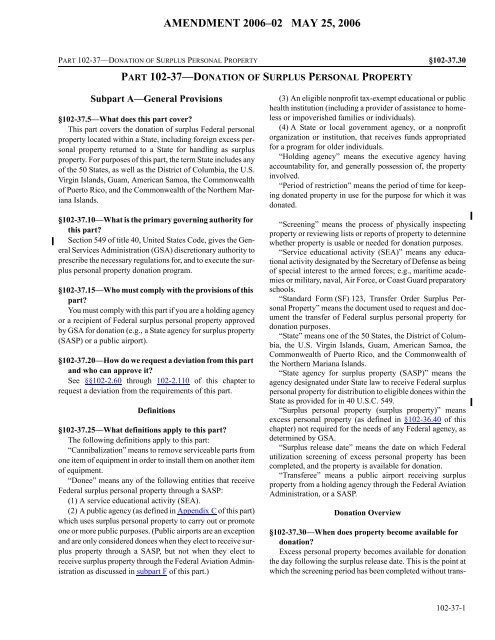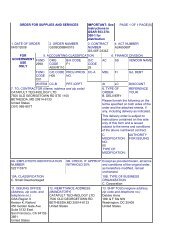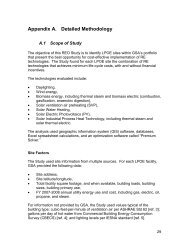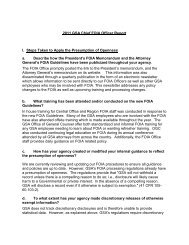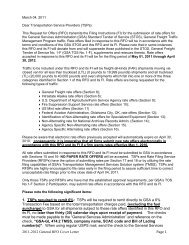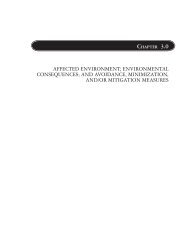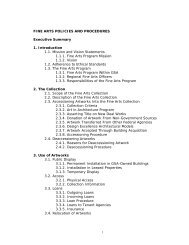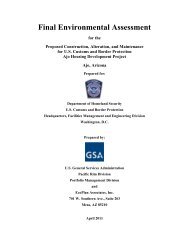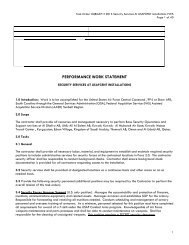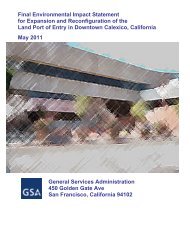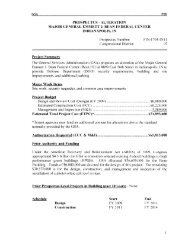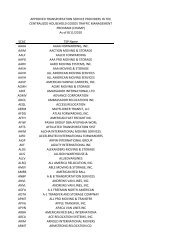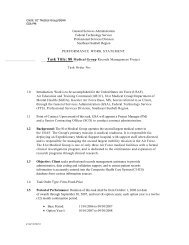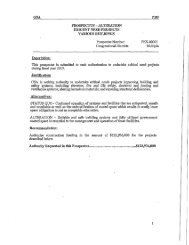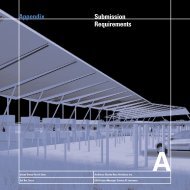FEDERAL MANAGEMENT REGULATION - GSA
FEDERAL MANAGEMENT REGULATION - GSA
FEDERAL MANAGEMENT REGULATION - GSA
You also want an ePaper? Increase the reach of your titles
YUMPU automatically turns print PDFs into web optimized ePapers that Google loves.
AMENDMENT 2006–02 MAY 25, 2006<br />
PART 102-37—DONATION OF SURPLUS PERSONAL PROPERTY §102-37.30<br />
PART 102-37—DONATION OF SURPLUS PERSONAL PROPERTY<br />
Subpart A—General Provisions<br />
§102-37.5—What does this part cover?<br />
This part covers the donation of surplus Federal personal<br />
property located within a State, including foreign excess personal<br />
property returned to a State for handling as surplus<br />
property. For purposes of this part, the term State includes any<br />
of the 50 States, as well as the District of Columbia, the U.S.<br />
Virgin Islands, Guam, American Samoa, the Commonwealth<br />
of Puerto Rico, and the Commonwealth of the Northern Mariana<br />
Islands.<br />
§102-37.10—What is the primary governing authority for<br />
this part?<br />
Section 549 of title 40, United States Code, gives the General<br />
Services Administration (<strong>GSA</strong>) discretionary authority to<br />
prescribe the necessary regulations for, and to execute the surplus<br />
personal property donation program.<br />
§102-37.15—Who must comply with the provisions of this<br />
part?<br />
You must comply with this part if you are a holding agency<br />
or a recipient of Federal surplus personal property approved<br />
by <strong>GSA</strong> for donation (e.g., a State agency for surplus property<br />
(SASP) or a public airport).<br />
§102-37.20—How do we request a deviation from this part<br />
and who can approve it?<br />
See §§102-2.60 through 102-2.110 of this chapter to<br />
request a deviation from the requirements of this part.<br />
Definitions<br />
§102-37.25—What definitions apply to this part?<br />
The following definitions apply to this part:<br />
“Cannibalization” means to remove serviceable parts from<br />
one item of equipment in order to install them on another item<br />
of equipment.<br />
“Donee” means any of the following entities that receive<br />
Federal surplus personal property through a SASP:<br />
(1) A service educational activity (SEA).<br />
(2) A public agency (as defined in Appendix C of this part)<br />
which uses surplus personal property to carry out or promote<br />
one or more public purposes. (Public airports are an exception<br />
and are only considered donees when they elect to receive surplus<br />
property through a SASP, but not when they elect to<br />
receive surplus property through the Federal Aviation Administration<br />
as discussed in subpart F of this part.)<br />
(3) An eligible nonprofit tax-exempt educational or public<br />
health institution (including a provider of assistance to homeless<br />
or impoverished families or individuals).<br />
(4) A State or local government agency, or a nonprofit<br />
organization or institution, that receives funds appropriated<br />
for a program for older individuals.<br />
“Holding agency” means the executive agency having<br />
accountability for, and generally possession of, the property<br />
involved.<br />
“Period of restriction” means the period of time for keeping<br />
donated property in use for the purpose for which it was<br />
donated.<br />
“Screening” means the process of physically inspecting<br />
property or reviewing lists or reports of property to determine<br />
whether property is usable or needed for donation purposes.<br />
“Service educational activity (SEA)” means any educational<br />
activity designated by the Secretary of Defense as being<br />
of special interest to the armed forces; e.g., maritime academies<br />
or military, naval, Air Force, or Coast Guard preparatory<br />
schools.<br />
“Standard Form (SF) 123, Transfer Order Surplus Personal<br />
Property” means the document used to request and document<br />
the transfer of Federal surplus personal property for<br />
donation purposes.<br />
“State” means one of the 50 States, the District of Columbia,<br />
the U.S. Virgin Islands, Guam, American Samoa, the<br />
Commonwealth of Puerto Rico, and the Commonwealth of<br />
the Northern Mariana Islands.<br />
“State agency for surplus property (SASP)” means the<br />
agency designated under State law to receive Federal surplus<br />
personal property for distribution to eligible donees within the<br />
State as provided for in 40 U.S.C. 549.<br />
“Surplus personal property (surplus property)” means<br />
excess personal property (as defined in §102-36.40 of this<br />
chapter) not required for the needs of any Federal agency, as<br />
determined by <strong>GSA</strong>.<br />
“Surplus release date” means the date on which Federal<br />
utilization screening of excess personal property has been<br />
completed, and the property is available for donation.<br />
“Transferee” means a public airport receiving surplus<br />
property from a holding agency through the Federal Aviation<br />
Administration, or a SASP.<br />
Donation Overview<br />
§102-37.30—When does property become available for<br />
donation?<br />
Excess personal property becomes available for donation<br />
the day following the surplus release date. This is the point at<br />
which the screening period has been completed without trans-<br />
102-37-1


